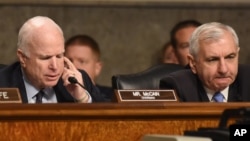In this special report from Capitol Hill, VOA's Senate correspondent spoke with multiple lawmakers about a weighty issue before Congress: authorizing the fight against the Islamic State group.
Even with the announced deployment of U.S. special forces on the ground in Syria, U.S. lawmakers remain sharply divided about the need for and wisdom of formal congressional authorization of the use of military force against Islamic State.
“We need a new AUMF [Authorization for the Use of Military Force], we really do,” said Democratic Senator Joe Manchin of West Virginia.
“I don’t think you need another AUMF, because we already have one,” said Republican Senator James Inhofe of Oklahoma, referring to a 2001 resolution that authorized the fight against terrorists after the attacks of September 11.
The Obama administration maintains that the 2001 AUMF adequately covers current anti-IS operations, but that Congress should pass a new one specifically tailored for the battles at hand.
At issue are Congress’ constitutional duties when America wages war and the reality of an often gridlocked, politically polarized legislature that may not be capable of rallying behind a common vision of what is required to defeat IS radicals in Syria and Iraq.
Some lawmakers, like Democratic Senator Jack Reed of Rhode Island, appear to be uncommitted.
“After 14 years, it probably makes sense to have a thoughtful, thorough debate about the authority [under which] we conduct these operations. But I don’t think it’s a legal necessity,” said Reed, the top Democrat on the Senate Armed Services Committee.
'Abdicating our responsibility'
Others insist a new resolution is needed, noting more than a year has passed since President Barack Obama ordered an air campaign targeting IS.
“We are abdicating our responsibility by not coming up with an AUMF that reflects the conditions today, rather than using a 14-year old AUMF for everything that the administration is pursuing today,” said Democratic Senator Martin Heinrich of New Mexico.
“It’s Congress’ job to make sure that we define when and where we go to war, if we go to war, and make sure that administrations aren’t given a blank check when the impacts to our men and women in uniform are so great every time we deploy them,” he added.
Many Republicans fault the White House.
“I’ve said for a long time we need an AUMF, but the AUMF should come from the president of the United States,” said Arizona Senator John McCain, the chairman of the Senate Armed Services Committee.
“If the president were really [fulfilling his duties as] commander in chief, he would call leaders of Congress over to the White House, and he’d say, ‘Here’s what we need to do and here’s why we need to do it, and I’m asking for your input and your help so we can get this really important authorization to go to war,’ ” McCain added. “But he doesn’t do that.”
Not so, according to independent Senator Angus King of Maine.
“It’s Congress’ responsibility. This isn’t the fault of the administration,” King said. “The president submitted a proposed AUMF months ago and Congress hasn’t acted on it. Our constitutional responsibility is to authorize acts of war, and to not do so is a failure of this institution.”
White House view
“The president has said he would welcome Congress' passing an authorization to use military force,” White House spokesman Josh Earnest said last week. “We wrote our own piece of legislation that Congress could pass, that would give the administration more specific authority to carry out our counter-ISIL campaign."
McCain acknowledges that the White House submitted an AUMF, but he contends it did so with no expectation that Congress would act on it and no presidential effort made to see that it did.
“What presidents are supposed to do is lead,” he said. “That’s what Bill Clinton did when Bosnia happened, after Srebrenica. He called the leaders of Congress over, he sat down and he talked to them. He spoke to the American people and said, ‘Genocide is taking place and I need the support of Congress.’ He was able to get it. What does this president do? Nothing.”
If Congress were to craft an AUMF, it would originate in the Senate Foreign Relations Committee and its counterpart in the House of Representatives.
The Senate committee’s chairman, Republican Bob Corker of Tennessee, has said he is open to an AUMF, but sees no urgency to proceed on one.
Image of disunity
Corker's hesitancy points to a fear expressed by some in Congress that the only thing worse than relying on an outdated AUMF would be to launch debate on a new one that fails to get majority support, presenting an image of disunity to the world — something IS would surely take note of.
“The problem is that there is such a division of views here that it would be difficult for us to come together in Congress,” said Ben Cardin of Maryland, the top Democrat on the Senate Foreign Relations Committee. “Even if the Senate could pass an authorization, to be able to get that through the House and then to have the administration in agreement — that would be a real challenge.”
Even so, Cardin says the deployment of a limited number of ground forces in Syria underscores the need for congressional authorization of the fight against ISIS.
Heinrich agrees. “Boy, if putting special forces on the ground in Syria does not get the point across to people [on the need for an AUMF], I’m not sure what will,” he said.










